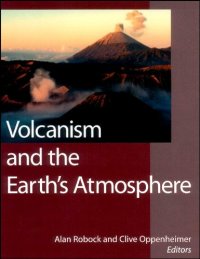
Ebook: Volcanism and the Earth's Atmosphere
Author: Alan Robock Clive Oppenheimer
- Series: Geophysical Monograph Series
- Year: 2004
- Publisher: American Geophysical Union
- Edition: 1
- Language: English
- pdf
Published by the American Geophysical Union as part of the Geophysical Monograph Series, Volume 139.
Volcanic activity can have a profound effect on the Earth's atmosphere and environment across many spatial and temporal scales. From being the source of most gases in the atmosphere over geologic time scales, to producing climate change, to threatening aviation, volcanic eruptions as well as non-eruptive volcanic gas and particle emissions provide a strong link between the lithosphere and the impact of the atmosphere on human activities. Since the massive 1991 Mt. Pinatubo eruption we have gained—and continue to gain—greater understanding of the impacts of volcanic eruptions on the atmosphere and climate. Among other things, we have learned about the winter warming effect on Northern Hemisphere continents, about effects on ozone chemistry, and about the impacts of volcanic radiative forcing on the carbon cycle. The importance of quantifying the effects of volcanic eruptions on interdecadal climate change has become more apparent in the context of anthropogenic global warming. New instruments and techniques have strengthened our ability to measure volcanic gas and aerosol concentrations, fluxes, and chemistry in the atmosphere. And new ice cores have allowed us to significantly improve the record of past volcanism
Volcanic activity can have a profound effect on the Earth's atmosphere and environment across many spatial and temporal scales. From being the source of most gases in the atmosphere over geologic time scales, to producing climate change, to threatening aviation, volcanic eruptions as well as non-eruptive volcanic gas and particle emissions provide a strong link between the lithosphere and the impact of the atmosphere on human activities. Since the massive 1991 Mt. Pinatubo eruption we have gained—and continue to gain—greater understanding of the impacts of volcanic eruptions on the atmosphere and climate. Among other things, we have learned about the winter warming effect on Northern Hemisphere continents, about effects on ozone chemistry, and about the impacts of volcanic radiative forcing on the carbon cycle. The importance of quantifying the effects of volcanic eruptions on interdecadal climate change has become more apparent in the context of anthropogenic global warming. New instruments and techniques have strengthened our ability to measure volcanic gas and aerosol concentrations, fluxes, and chemistry in the atmosphere. And new ice cores have allowed us to significantly improve the record of past volcanism
Download the book Volcanism and the Earth's Atmosphere for free or read online
Continue reading on any device:

Last viewed books
Related books
{related-news}
Comments (0)